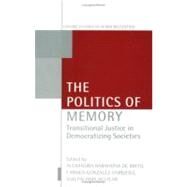The Politics of Memory Transitional Justice in Democratizing Societies
, by De Brito, Alexandra Barahona; González Enríquez, Carmen; Aguilar, Paloma- ISBN: 9780199240906 | 0199240906
- Cover: Paperback
- Copyright: 6/21/2001
One of the most important political and ethical questions faced during a political transition from authoritarian or totalitarian to democratic rule is how to deal with legacies of repression. Indeed, some of the most fundamental questions regarding law, morality and politics are raised at suchtimes, as societies look back to understand how they lost their moral and political compass, failing to contain violence and promote the values of tolerance and peace. The Politics of Memory sheds light on this important aspect of transitional politics, assessing how Portugal, Spain, the countriesof Central and Eastern Europe and Germany after reunification, Russia, the Southern Cone of Latin America and Central America, as well as South Africa, have confronted legacies of repression. The book examines the presence - or absence - of three types of official efforts to come to terms with thepast: truth commissions, trials and amnesties, and purges. In addition, it looks at unofficial initiatives emerging from within society, usually involving human rights organisations (HROs), churches or political parties. Where relevant, it also examines the 'politics of memory,' whereby societiesre-work the past in an effort to come to terms with it, both during the transitions and long after official transitional policies have been implemented or forgotten. The book also assesses the significance of forms of reckoning with the past for a process of democratization or democratic deepening.It also focuses on the role of international actors in such processes, as external players are becoming increasingly influential in shaping national policy where human rights are concerned.







